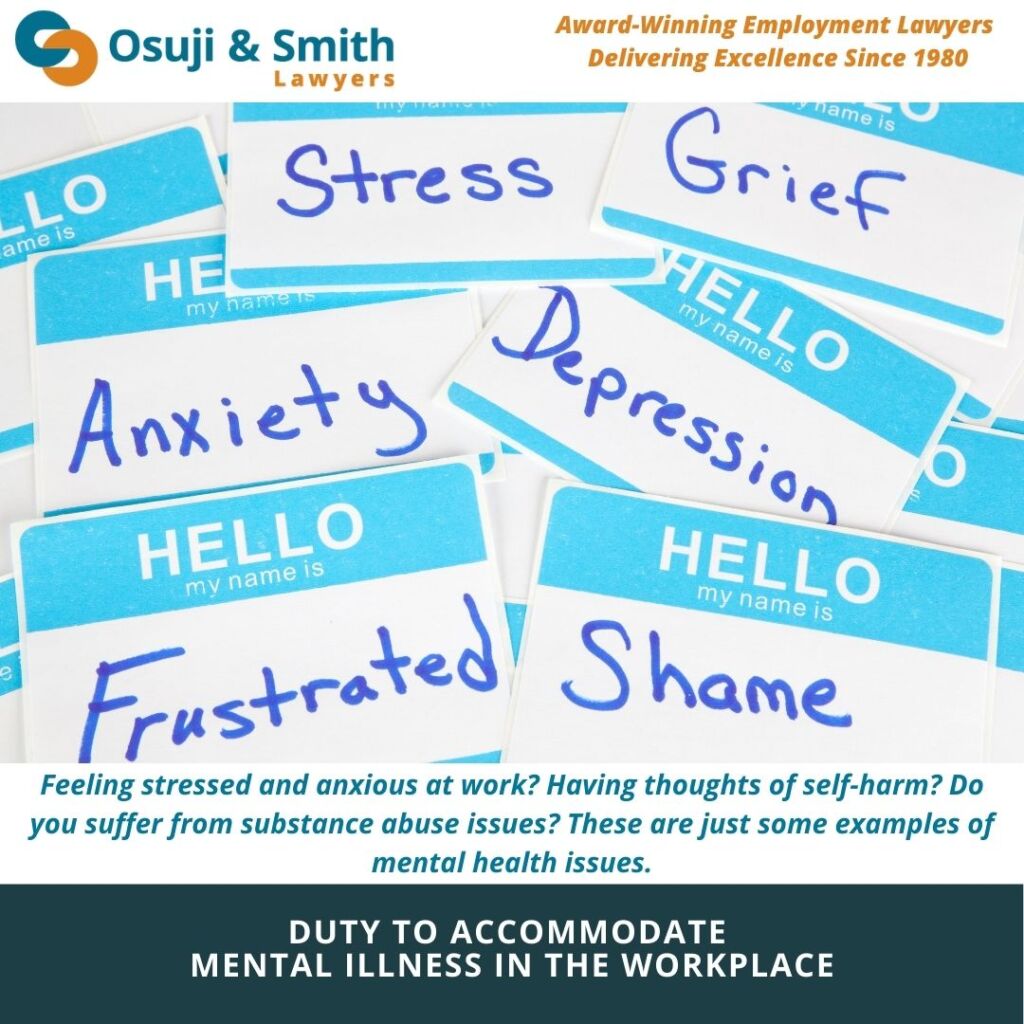Duty to Accommodate MENTAL ILLNESS IN THE WORKPLACE
Feeling stressed and anxious at work? Having thoughts of self-harm? Do you suffer from substance abuse issues? These are just some examples of mental health issues.
Life can be stressful at the best of times and employment is a big part of life for many individuals. Most of us spend more time in our offices with our co-workers than we do at home with our families. Such high pressure environments with little to no work-life balance can cause a lot of stress and anxiety. You are not alone. There is help available.
Mental Health at Work

Work is a big part of an individual’s identity and therefore, it is important to our health and well-being. Thus, physical and mental health affect our job performance. Mental illnesses are health problems that affect the way we think about ourselves and interact with the world around us. Depression and anxiety disorders, for example, are among the most common mental illnesses which can come up during times of stress and uncertainty.
People who experience mental illness may appear less confident, have difficulty concentrating, learning and making decisions. Some may also have substance abuse issues and appear less productive than usual. People who experience such issues may take frequent absences from work which in turn affects the workplace.
Medical leave covers physical and mental disability. The Alberta Human Rights Act prohibits discrimination based on physical and mental disabilities. Mental disability is defined in the Act as any mental disorder, development disorder or learning disorder, regardless of the cause or duration of the disorder. Employers are required to accommodate employees who require medical leave.
The Duty to Accommodate
The Duty to Accommodate is a legal duty imposed on employers. The Supreme Court of Canada has ruled that an employer has a legal duty to take reasonable steps, in policies or conditions of work, to accommodate an employee’s individual needs which includes mental disability.
The leading case in Canada that addresses the duty to accommodate is Syndicat des employé-e-s de techniques professionnelles & de bureau d’Hydro-Québec, section 2000 (SCFP-FTQ) c. Corbeil, 2008 SCC 43, 2008 CarswellQue 6436 which states:
The purpose of the duty to accommodate is to ensure that persons who are otherwise fit to work are not unfairly excluded where working conditions can be adjusted without undue hardship…Because of the individualized nature of the duty to accommodate and the variety of circumstances that may arise, rigid rules must be avoided. If a business can, without undue hardship, offer the employee a variable work schedule or lighten his or her duties – or even authorize staff transfers – to ensure that the employee can do his or her work, it must do so to accommodate the employee If the characteristics of an illness are such that the proper operation of the business is hampered excessively or if an employee with such an illness remains unable to work for the reasonably foreseeable future even though the employer has tried to accommodate him or her, the employer will have satisfied the test….A decision to dismiss an employee because the employee will be unable to work in the reasonably foreseeable future must necessarily be based on an assessment of the entire situation. Where, as here, the employee has been absent in the past due to illness, the employer has accommodated the employee for several years and the doctors are not optimistic regarding the possibility of improved attendance, neither the employer nor the employee may disregard the past in assessing undue hardship.
Available Resources
Whether you are an employee or employer or a coworker who wants to help another employee, there a lot of available resources in Alberta. Take advantage of your employment and family assistance plans or contact any of these organization in your community:
- If suicide is a possibility, call 911
- Alberta Mental Health Help Line: 1 (877) 303-2642
- Alberta Addictions Helpline 1 (866) 332-2322
- Distress Line (Edmonton and area): (780) 482-4357
- Distress Centre (Calgary and area): (403) 266-4357
- Distress Line of South Western Alberta: (403) 327-7905
- First Nations and Inuit Hope for Wellness Help Line 1 (855) 242-3310
- Kids Help Phone 1 (800) 668-6868
- Rural Distress Line: 1 (800) 232-7288
- 211 is here to help you find the right community and social services. You can dial 2-1-1 to speak to an Information & Referral Specialist, or search the online community resource directory, or chat online with them from 12-8pm MT daily.
To learn more about your rights, visit:
https://alberta.cmha.ca/mental-illnesses-in-the-workplace/
For more information and resources, please visit:
- https://www.albertahealthservices.ca/amh/Page2673.aspx
- https://alberta.cmha.ca/mental-illnesses-in-the-workplace/
Have you been discriminated against in your workplace due to mental illness? Please contact Osuji & Smith Lawyers for assistance via 403-283-8018 or email [email protected].
Author: Ayendrila Sharma

